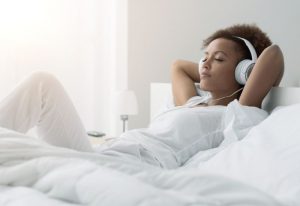Sleep is essential to feeling, performing and looking your best. Tightly linked to your overall health, your sleep is important, so design your sleeping space to help you to achieve the best sleep quality possible. For the ultimate sleep environment, consider each of your senses and the role of those senses in helping to produce a state conducive to consistently achieving a good night’s sleep.
Creating the right sleep space doesn’t have to be a costly venture. With mindful planning, you can create a great sleep space even on a tight budget.
Be Mindful About Your Sleep Environment
 It starts with framing the purpose of your bedroom in your mind and letting that vision shape your plans. The primary purpose of your bedroom should be for sleep and that is what the environment should reflect.
It starts with framing the purpose of your bedroom in your mind and letting that vision shape your plans. The primary purpose of your bedroom should be for sleep and that is what the environment should reflect.
Aim for peaceful and relaxing, understanding what those concepts mean to you. Stimulating entertainment items, such as video games and the like, should be in the living area, not the sleeping area. Consider a bedroom ban on electronics altogether for improved sleep quality.
Consider What You See
Strive for a visually peaceful bedroom by reducing clutter, which is linked to higher stress levels. Stress, of course, can interfere with getting good sleep. Light is an important factor in sleep quality. While bright natural light early in the day can help you sleep better at night, bright light in the evening can be disruptive to your sleep duration and quality. That is because it can delay or suppress the production of melatonin, often referred to as the sleep hormone due to its role in making you feel sleepy.
Keep your bedroom lights dim in the evening, using low wattage lamps as opposed to a bright overhead light. When you lay down to sleep, make sure the room is dark because even a small amount of light can reduce sleep quality. People living in urban areas may have to take extra steps to achieve a dark sleep environment due to light pollution. Black-out curtains can be a big help, but if light-blocking curtains don’t fit into your budget right now, a simple cloth sleep mask over your eyes can do the trick.
Make It Feel Good
For your best sleep, create an environment that feels relaxing and comfortable. Get the best mattress and bedding you can afford. Try to use natural fibers that feel good on your skin. Many people find weighted blankets help them feel cozy and comfortable. Temperature plays an important part in helping you to sleep better. The general scientific consensus is that about 65 degrees Fahrenheit is the optimal temperature for a good night’s sleep.
Create an evening routine with a focus on making your body feel relaxed and reducing mental stress, perhaps including meditation or a warm bath. Going to bed at the same time each night helps your body and mind get in the habit of going into relaxation and sleep mode.
Let the Scent Take You Away
The smell of fresh bedding and a clean room can be very relaxing. Give your sleeping area a relaxing scent, whether that means clean and fresh to you, or you choose to try sleep-promoting aromatherapy scents.
Lavender is one relaxation and sleep promoting scent with clinical studies demonstrating its usefulness. Other commonly used scents used to promote relaxation and sleep include bergamot, sandalwood, frankincense and sweet marjoram.
Ride the Waves of Sound
Sound can be a positive or a negative when it comes to getting a good night’s sleep. For some light-sleeping people, sound can be a real issue and highly disruptive to sleep. If that is the case for you, white noise or something similar may provide a solution, muffling outside sounds that would normally wake you. Earplugs offer another option, and are inexpensive and easy to use.
Many people find it easier to drift off to sleep with soothing, relaxing music or even a relaxing, non-stimulating audio book. Still others find that music in specific sound frequencies, such as 432 Hz, and binaural beats help them fall asleep and can have a positive impact on sleep quality.
What and When You Taste Can Make a Difference
 Taste may not be top of mind when you think about preparing an environment for better sleep, but it is an important factor. Consider it to be important preparatory work for your inner sleep environment.
Taste may not be top of mind when you think about preparing an environment for better sleep, but it is an important factor. Consider it to be important preparatory work for your inner sleep environment.
Avoid caffeine after early afternoon or, if you really must, late afternoon. Caffeine consumption within six hours of bedtime will have a negative impact on your sleep. Avoid ultra-processed foods. They’re bad for your health and associated with poor sleep quality. Fatty, high sugar and spicy foods near bedtime can make it harder for you to fall asleep.
Don’t eat heavy meals in the late evening. Instead, choose meals made up of lean proteins and healthy, minimally processed vegetables. Try to eat earlier in the evening, rather than within two hours of bedtime.







